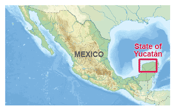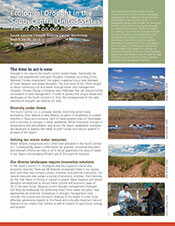Mexican Yucatan State Coast Report Card
 In July 2016, IAN was asked by faculty at the Universidad Nacional Autonoma de Mexico (UNAM) to assist with the development of an ecosystem health report card for the Yucatan State coastal zone on the Gulf of Mexico. This region has areas of mangroves and wetlands along the shore that provide nesting and nursery habitat for flamingoes, fish, and sea turtles. These habitats also support coastal fisheries and a tourism economy. However, the beauty and natural resources there have led to an explosion of coastal development. On 4-5 August 2016, Dr. Heath Kelsey and Jane Hawkey from IAN facilitated a preliminary report card workshop at the National Coastal Resilience Laboratory (LANRESC) in Sisal, Mexico, to begin the ecosystem assessment process. This newsletter, produced in Spanish and English, is the result of that workshop.
In July 2016, IAN was asked by faculty at the Universidad Nacional Autonoma de Mexico (UNAM) to assist with the development of an ecosystem health report card for the Yucatan State coastal zone on the Gulf of Mexico. This region has areas of mangroves and wetlands along the shore that provide nesting and nursery habitat for flamingoes, fish, and sea turtles. These habitats also support coastal fisheries and a tourism economy. However, the beauty and natural resources there have led to an explosion of coastal development. On 4-5 August 2016, Dr. Heath Kelsey and Jane Hawkey from IAN facilitated a preliminary report card workshop at the National Coastal Resilience Laboratory (LANRESC) in Sisal, Mexico, to begin the ecosystem assessment process. This newsletter, produced in Spanish and English, is the result of that workshop.
Designing an NPS Regional Resource Stewardship Strategy Tool
 IAN has partnered with the National Park Service for the last seven years to produce their natural resource condition assessment (NRCA) reports. Dr. Simon Costanzo, Dr. Bill Dennison, and Jane Hawkey were invited to partner with the Park Service once again on the prioritization and implementation of recommendations from these completed natural resource reports. At the workshop held November 7, 2016 at Monocacy National Battlefield, National Capitol Region natural and cultural resource park managers were introduced to, and provided feedback on, IAN's preliminary vision of Resource Stewardship Strategy's database tool. This tool will be designed to provide a transparent and justifiable decision-making approach for prioritizing and testing the feasibility of actions to address natural and cultural resource recommendations. It will allow activity input and revisions, and have a sorting function.
IAN has partnered with the National Park Service for the last seven years to produce their natural resource condition assessment (NRCA) reports. Dr. Simon Costanzo, Dr. Bill Dennison, and Jane Hawkey were invited to partner with the Park Service once again on the prioritization and implementation of recommendations from these completed natural resource reports. At the workshop held November 7, 2016 at Monocacy National Battlefield, National Capitol Region natural and cultural resource park managers were introduced to, and provided feedback on, IAN's preliminary vision of Resource Stewardship Strategy's database tool. This tool will be designed to provide a transparent and justifiable decision-making approach for prioritizing and testing the feasibility of actions to address natural and cultural resource recommendations. It will allow activity input and revisions, and have a sorting function.
Ecological drought in the South Central United States newsletter
 The Department of the Interior Climate Science Centers (CSCs) and their managing organization, the National Climate Change and Wildlife Science Center at the U.S. Geological Survey, have chosen the emerging climate science field of Ecological Drought as a research focus area. This newsletter highlights the outcomes of a two-day workshop held in Norman, Oklahoma, as part of a series of meetings at each of the nation's eight CSCs. The South Central CSC is a regional partnership of researchers, land managers, tribes, and others working collaboratively to develop tools and strategies that address the impacts of climate, including drought. Drought is not new to the South Central United States. Historically the region has experienced multi-year droughts. However, climate change is bringing new challenges that will require further innovations in land management.
The Department of the Interior Climate Science Centers (CSCs) and their managing organization, the National Climate Change and Wildlife Science Center at the U.S. Geological Survey, have chosen the emerging climate science field of Ecological Drought as a research focus area. This newsletter highlights the outcomes of a two-day workshop held in Norman, Oklahoma, as part of a series of meetings at each of the nation's eight CSCs. The South Central CSC is a regional partnership of researchers, land managers, tribes, and others working collaboratively to develop tools and strategies that address the impacts of climate, including drought. Drought is not new to the South Central United States. Historically the region has experienced multi-year droughts. However, climate change is bringing new challenges that will require further innovations in land management.
Assessing the health of the Indian River Lagoon
 IAN and the Marine Resources Council released the Indian River Assessment framework in November. IAN facilitated a workshop in January this year to develop this assessment framework. The workshop had about 60 participants, with stakeholders from around the region determining ways to measure the health of the Lagoon from water quality, habitat, fish and shellfish, and wildlife perspectives. The Lagoon was divided into 5 sub-regions in a roughly north to south orientation. Potential indicators for each of these sub-regions were discussed, and will be pursued in the development of the assessment report, which is the next step in the project. Immediately following the January workshop, Indian River Lagoon suffered tremendous algal blooms and subsequent fish kills, which highlight the importance of this assessment process. We hope to work further with our partners to develop the State of the Indian River Lagoon Report.
IAN and the Marine Resources Council released the Indian River Assessment framework in November. IAN facilitated a workshop in January this year to develop this assessment framework. The workshop had about 60 participants, with stakeholders from around the region determining ways to measure the health of the Lagoon from water quality, habitat, fish and shellfish, and wildlife perspectives. The Lagoon was divided into 5 sub-regions in a roughly north to south orientation. Potential indicators for each of these sub-regions were discussed, and will be pursued in the development of the assessment report, which is the next step in the project. Immediately following the January workshop, Indian River Lagoon suffered tremendous algal blooms and subsequent fish kills, which highlight the importance of this assessment process. We hope to work further with our partners to develop the State of the Indian River Lagoon Report.
On the Horizon
- IAN staff are attending the CommOCEAN International Marine Science Communication Conference in Bruges, Belgium December 6-8, 2016.
- Bill Dennison and Don Boesch will be teaching Science for Environmental Management (MEES 698Y) from 10-12 pm on Fridays in Spring 2017 semester.
- Bill Dennison, Michael Paolisso, Christina Prell and Klaus Habacek will be teaching Coupled Human and Natural Systems (MEES 620) from 2-5 pm on Thursdays in Spring 2017 semester.